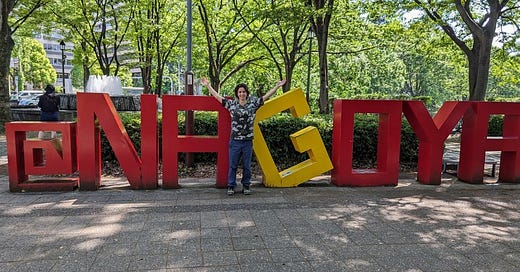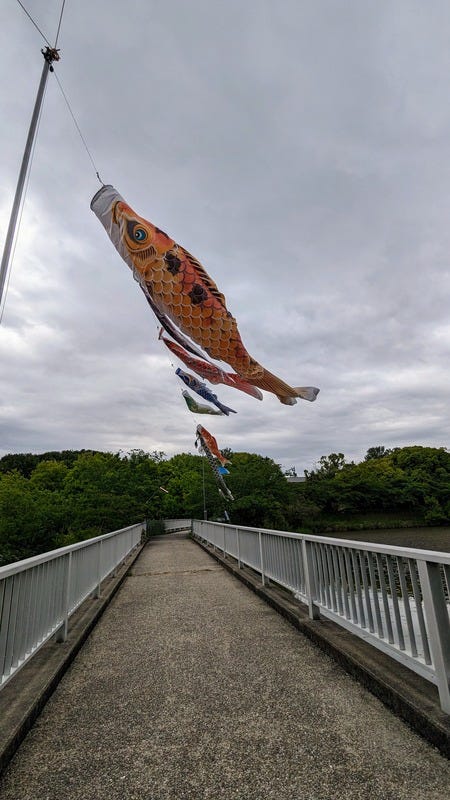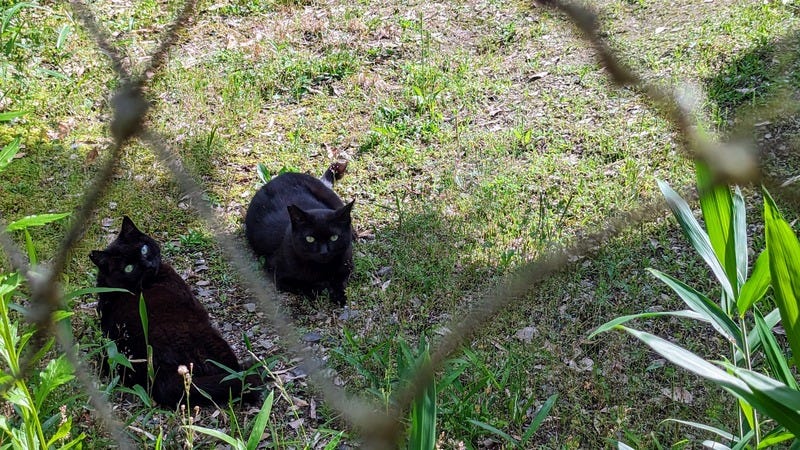Hello, if you’re new here, welcome! I really appreciate you trusting me to share relatable true stories about being a trans, non-binary person and martial artist, writing, and travel. I write about my journey of coming out and my lifelong martial arts practice (I’ve been training in Kokikai Aikido since 2008).
Before I get into this week’s travel stories, I want to share a cool project from my friend
: SmallStack: a library featuring newsletters and publications with small audiences. I enjoy reading posts from my friends more than from famous people I don’t know personally, so I end up subscribing and really appreciating a lot of smaller or growing publications. I think this is going to be a great way to find high-quality but not as well known publications! Check it out:I’ve been in Japan for the last week and a half, halfway through our trip. We’ve attended eight of Sensei’s classes so far and trained hard. It’s been great, and overwhelming, and challenging, and beautiful, and tiring. But overall very good.
Most people in Japan look at me like I’m a foreigner, but not like I’m a woman dressing incorrectly / a young person wearing a mask as an ego trip, like they do in the US. It’s refreshing. I think it’s completely fair if people look at me and think mostly, “you don’t look Japanese.” I far prefer it to people looking at me and judging me for my gender expression and clothing choices. It also helps that a lot of Japanese fashion and hairstyles have androgynous elements. And many people wear masks in public, both young and old people.
In a touristy area I received a look from a white man that made me blanch, a familiar look to be sure, a look of evaluation, ownership, entitlement to my body. But what I realized was the peace of the absence of such looks for most of the time I’ve been here. Local women and children walk around our neighborhood constantly, and although I do not know their experience, from their attitude, I suspect it feels safer and they do not expect to be accosted walking from the train station, a contrast from Oakland or Boston. I haven’t seen anyone cross the street to avoid another pedestrian (which is extremely common in the neighborhoods I’ve lived in the US).
Part of this is my privilege in traveling with a male partner and both appearing as a straight couple / as somewhat masculine myself.
Don’t get me wrong, in aikido I am constantly referred to as / considered a woman. I’ve made some kind of peace with that. What people think of me doesn’t change who I am. If their stereotypes don’t allow them to learn who I am, that’s their limitation, and not my responsibility.
Sort of like if someone says my muscles are weak because I’m a vegetarian, but I can push over people bigger than me, I’ve showed proof that they’re wrong, but it’s up to them to see it or not. I’m not weak because I’m a woman. A couple of layers of incorrect there. On the flip side, it’s not emasculating to men if I can train in aikido with them as equals. Society has all these bullshit ideas of control and power that so many people never question. But all I can do is try to share my true experience.
The language barrier (I speak very little Japanese) has not been preventing me from practicing aikido, shopping at the supermarket, etc. Many people here speak a little English, and I can understand a lot of Japanese instructions, especially for physical things, through context clues. What my lack of fluency does prevent is I’m not able to chat with people casually, to find out what they might do outside of aikido class, what their interests are, or have a basic get-to-know-you conversation.
The most unusual encounter of our trip (so far) started with a handful of trash. You see, there’s no garbage cans on street corners, in train stations, or most places in public. So we had a few empty food containers and a banana peel in hand as we got onto the subway. The locals don’t hold their trash in their hands—they come prepared with a plastic bag so they can tuck it away tidily.
Half a stop later, the man sitting next to Dave nudged him and offered a plastic bag for our trash. This man was traveling with a wooden hat and well-worn walking stick, traditional (not Western) clothes, and a white beard. He looked like a Japanese pilgrim.
Dave said thank you in Japanese and we put the trash in the bag. The man pulled up Google Translate on his phone and spoke in Japanese, showing us the English translation on the screen. He asked us where we were going. Dave pulled out his phone and did the opposite translation, explaining we were on our way to the aikido dojo.
We talked about how long we were in Japan - 3 weeks. The man said after his retirement, he travels the world. He came back from India recently, a very beautiful trip. He asked again about our destination, how we would get to the dojo, “Walking?”
He made a quick phone call in Japanese.
He Google Translated another few sentences for us. “You can ride with me to the dojo. My wife is picking me up at the station in the car.”
Dave and I looked at each other and laughed, in that combination wonderment and fear when people act in ways you would never imagine in NYC.
The last time we got in a vehicle with people we didn’t know was at Echo Lake, near Lake Tahoe in California, when we saw some older folks loading a kitchen stove into a boat to take it to a cabin and offered to help. We ended up getting a boat ride across the lake from our new friends after hauling their stove up a steep, muddy hill. It was a unique experience of getting to know the locals.
The previous time we got in a vehicle with someone we didn’t know was at a Florida campground, after chatting with an old man at our campfire for a couple of hours. He kept insisting he wanted to take us to see ghosts at the haunted part of the abandoned highway overpass. He really insisted, and with the understanding that it was half a mile away, we made sure we had our phones and wallets and got in his car with him. Luckily, the trip was underwhelming. He drove slowly to a spooky but not that spooky section of road, and we got out for a few minutes to watch the cars driving under us on the highway. Then we got back in the car and he drove slowly back to our campsite.
So yes, the two of us have taken locals up on offers for transportation before.
On the Japanese subway, our new acquaintance gestured, “come with me,” I nodded and Dave Google Translated, “yes, we will come with you. Thank you.”
We got off the train with him and sat down outside the station for a minute, still trying to hold a Google Translated conversation. His wife arrived driving a car, looking impatient, and I awkwardly stood and waved, said “arigato,” and then got in the back seat when prompted. She started driving away from the station, away from the dojo.
We had a rushed exchange of phones showing maps and addresses as the car sped down the street. I realized I didn’t know the words for “left,” “right,” “that way,” etc. I wondered if we’d end up at this couple’s house in Nagoya somewhere or wherever they needed to run errands, instead of at our aikido class.
We had a breakthrough when our new acquaintance recognized the name of the huge mall right nearby the dojo. The driver turned the car around, “hantai, hantai” - I know that one, “opposite, other way” from aikido.
They dropped us off at the dojo, we said thank you very much in the two languages, and then they drove off. Truly a surreal experience.
We have less than a week left of our trip in Japan. As with any good trip, I’ll know this place well enough to miss here and wish we were staying longer. Maybe we’ll get out to the mountains. The big aikido event with Americans and Australians all coming to visit Sensei is this weekend. But in truth, it feels like a special opportunity to learn from Sensei in his normal, private classes in the dojo as we’ve been doing. I’m looking forward to seeing everyone at the larger event this weekend as well.
Thanks so much for reading! Let me know what you think in the comments.
Take care,
Rey












Hi Rey,
Would I get into a car with a stranger? No!!
Did I ever? Yes, twice.
This was in Boston, in the late 1960s. The Boston Strangler was fresh on everyone's minds.
Nonetheless, a bunch of us college kids spontaneously decided to hitchhike on Huntington Avenue to a party one late Friday afternoon. A guy picked us up, he said, so that nobody else would. He scolded us for stupidly risking our lives, but he brought us to our party destination safely.
Two years later, my date's car ran out of gas around 11:30 pm Saturday night. There were no cell phones in those days. We were walking around in the middle of nowhere and feared for our safety.
A creepy looking stranger pulled over, heard our plight, and offered us a ride to get gas. We squeezed into his creepy front seat. I kept my hand on the door handle for a quick escape if needed. My date, between us, kept his hand on the pocket knife in his jacket, just in case.
As we got out of the creepy stranger's car, he told us he was more scared than we were. But because we reminded him of his small children who might be in trouble some day, he took a chance on us. His weird small eyes stared at me nervously, and he whispered to me: If I found his daughter lost in the street ten years from now, would I please help her out?
Safe travels! Love reading your stories! Fabulous photos! Enjoy your trip!
It sounds like a great visit. Thanks for describing it for us. True, but I am not proud of it: when I read the title question, my first thought was "Hell No!" Years ago, when I lived in LA, I offered a ride to a young man I didn't know -- I don't remember the circumstances, or why I felt compelled to offer him a ride. What I remember was second-guessing myself the entire time, and despite his kind and gracious demeanor, I felt relieved when we got where he needed to go, and he got out of my car. I felt good about having extended the kindness, at the same time I felt foolish and careless for offering a total stranger a ride. It makes me sad, knowing that I have yet to unlearn my unconscious assumptions that danger and conflict are more likely than kindness and cooperation, and what's even sadder is that I am not odd in this way; it is the prevalent assumption in our culture. That sadness coexists with the knowledge that it is entirely reasonable for many people (including myself) to err on the side of mistrust. <sigh>